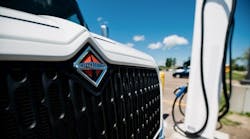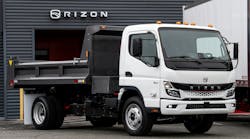In an event designed to showcase the major advances in clean diesel technology spurred largely due to stringent emissions standards and regulations established by the state of California and its Air Resources Board (CARB), diesel industry and CARB officials held a press conference Wednesday to highlight the key policies and events that led to the transformation of “clean diesel” technology.
The press conference and day-long exhibition of some of the most modern clean diesel engines in the world were held outside the Cal-EPA building in downtown Sacramento.
In a video presentation to open the press conference, CARB Chair Mary Nichols outlined the progress and future challenges in the advancement of diesel technology.
“We’ve had tremendous success thanks to the willingness and ability of the industry to get creative when faced with the challenge of reducing emissions and nitrogen oxide and fine particulates,” she said.
“Today’s diesel engines emit about 90% less of these pollutants than they did when we first started this effort,” Nichols said. “And while we still have work to do — especially in turning over the fleet of older vehicles that are out there on the roads, the fact is that we’ve seen actual air quality improving, especially around our ports where we first started the effort to really turn over the fleet.”
“For the past decade, we have been setting stringent diesel engine emission and clean fuel standards,” CARB Executive Officer James Goldstene said. “At every stage, industry has responded by developing a range of technologies that deliver cleaner diesel engines. Thanks to this progress, California is on track to reduce the health risks associated with exposure to diesel exhaust by 85% by the year 2020.”
Allen Schaeffer, executive director of the Diesel Technology Forum, highlighted the major advancements in clean diesel technology and remembered the early days when many thought new emissions standards would lead to the end of diesel engines.
“Today we come together to recognize a fundamental transformation of an industry to a new technology –clean diesel – the most advanced diesel engines, ultra-low sulfur diesel fuels and advanced emissions control technology,” Schaeffer said.
“Diesel technology plays a central role in the California economy, contributing more than $13 billion on an annual basis here. To the broader U.S. economy, diesel technology and fuels add $483 billion in value and about 1.25 million jobs nationwide and are a high value export, accounting for $46.2 billion in exports in 2009,” Schaeffer added. “Diesel’s economic importance here in California is matched only by its progress in reducing emissions and improving California’s air quality.”
Schaeffer noted that according to CARB, from 1990 through 2015:
• Fine particulate matter (PM2.5) from heavy-duty diesel trucks will have declined by nearly 74%; from non-road construction machines by 63% and 73% in farm equipment.
• Oxides of nitrogen — a component of ozone or smog formation — will have declined by 21% in heavy-duty trucks, 52% in non-road construction equipment and 65% in farm equipment.
In addition, Schaeffer said that today in California, more fine particles come from brake and tire wear than from all on-road diesel engines. He added that because of these major advances, it would take 60 of today’s new diesel trucks to equal the particulate emissions of just one truck made in 1988.
“Over a decade ago the diesel industry was challenged to fundamentally transform its technology to meet near zero emissions levels,” Schaeffer said. “Many thought it could not be done, but today proves what can happen when America’s diesel engineers and equipment makers roll up their sleeves and get to work.”
The next challenges, Schaeffer said, involve retaining our clean air progress while improving efficiency and lowering GHG emissions, and exploring more advanced fuels. “It’s a very big challenge and is the next chapter in the clean diesel story. Early results are encouraging — these new 2012 truck engines are not only near zero emissions but they are also up to 10 or 12% more energy efficient.”
“In a changing world, what is beautiful about diesel power has stayed beautiful and that which was unattractive has been eliminated,” said Jed Mandel, president of the Truck and Engine Manufacturers Assn. “We embrace the fuel efficiency, power, performance, reliability, durability, low hydrocarbon (HC) and carbon monoxide (CO) emissions and high torque of diesel power. We essentially have eliminated NOx and PM emissions, minimized noise, and burn a very low-sulfur fuel.”
"Effective environmental regulations can only be developed through a strong partnership between government and industry, and that's what you see here today," said Dr. John Wall, vice president and chief technical officer for Cummins Inc. "Cummins has always been committed to working with the Air Resources Board, the EPA and with other emissions regulators to support a clear, consistent, challenging and enforceable process that recognizes the needs of business and provides incentives for companies to create innovative technologies as well as jobs in this country.”
Video of the press conference and diesel technology showcase is available on the Diesel Technology Forum www.dieselforum.org.


